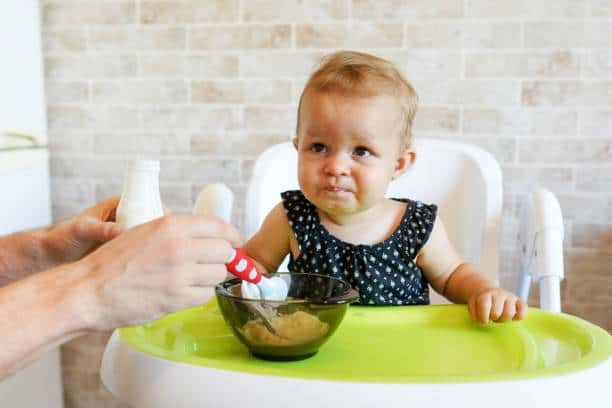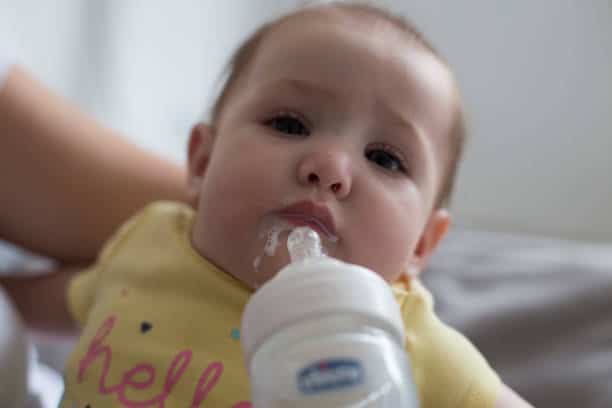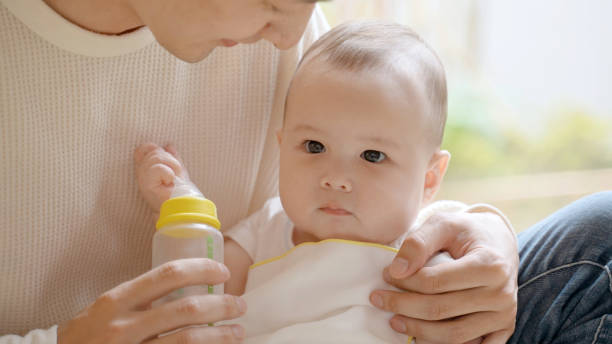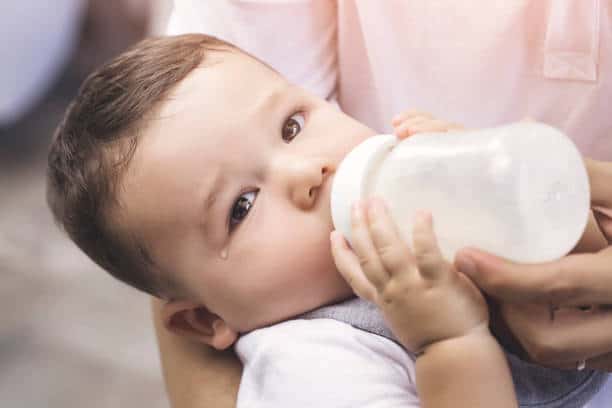Formula feeding is a common practice among parents who are unable to breastfeed or choose not to. However, it can be frustrating when a baby who has been happily drinking from a bottle suddenly refuses it.
This can be a cause for concern, as babies need to consume enough milk to grow and develop properly.
Understanding the Problem of formula fed baby suddenly refusing bottle can be a stressful situation for parents, but it is important to understand that it is a common problem that many formula-fed babies face. Babies can refuse a bottle for a variety of reasons, ranging from teething pain to a change in the taste of the formula.
It is important to identify the cause of the refusal in order to find a solution that works for both the baby and the parents.
Common Causes of Bottle Refusal There are several common causes of bottle refusal, including teething, illness, and a change in the formula or bottle. Babies may also refuse a bottle if they are experiencing discomfort or pain, such as from gas or reflux.
It is important to rule out any underlying medical issues before attempting to address the problem.
1. Understanding the Problem of Bottle Refusal

Bottle refusal is a common feeding-related problem that parents of formula-fed babies may encounter. It can be a frustrating and stressful experience for both the baby and the parents.
Understanding the reasons behind sudden bottle refusal can help parents resolve the issue and ensure their baby is getting the nutrition they need.
There are several reasons why a baby may suddenly refuse the bottle. Some of the most common reasons include:
- Teething: Teething can cause discomfort and pain, making it difficult for a baby to suck on a bottle nipple.
- Illness: If a baby is sick, they may not feel like eating and may refuse the bottle.
- Change in routine: A change in routine, such as starting daycare or a new caregiver, can cause stress and anxiety for a baby, leading to bottle refusal.
- Overfeeding: Overfeeding can cause a baby to feel full and not want to eat, leading to bottle refusal.
- Introduction of solid foods: When a baby starts eating solid foods, they may be less interested in drinking formula from a bottle.
It is important for parents to identify the reason behind their baby’s sudden bottle refusal and address it accordingly. For example, if teething is the cause, parents can try giving their baby a teething toy to help ease the discomfort.
If illness is the cause, parents should consult with their pediatrician to ensure their baby is getting the proper care and treatment.
If a baby continues to refuse the bottle for an extended period of time, it is important to seek the advice of a healthcare professional. They can help determine if there is an underlying medical issue or feeding problem that needs to be addressed.
Overall, understanding the reasons behind sudden bottle refusal and taking appropriate action can help parents ensure their baby is getting the nutrition they need and avoid unnecessary stress and frustration.
2. Common Causes of Bottle Refusal

Formula-fed babies may suddenly refuse the bottle for a variety of reasons. Here are some of the most common causes of bottle refusal:
- Teething: When babies are teething, they may experience pain and discomfort in their gums, which can make it difficult for them to suck on a bottle.
- Illness: Babies who are sick may refuse to eat or drink, as they may not have the energy or appetite to do so. Illnesses such as fever, flu, vomiting, and diarrhea can all cause a baby to refuse the bottle.
- Distraction: Babies can be easily distracted by their surroundings, and may refuse to eat or drink if there is too much noise or activity around them.
- Not Hungry: Sometimes babies simply aren’t hungry, and may refuse the bottle even if they are not experiencing any discomfort or illness.
- Colic: Colic is a common condition in infants that can cause excessive crying and fussiness. Babies with colic may refuse the bottle due to discomfort or pain.
- Taste and Texture: Some babies may refuse the bottle if they don’t like the taste or texture of the formula.
- Difficulty Breathing: Babies who have difficulty breathing due to congestion or other respiratory issues may find it difficult to suck on a bottle.
- Gas and Acid Reflux: Babies with gas or acid reflux may experience discomfort when feeding, which can cause them to refuse the bottle.
- Tongue Tie: A tongue tie is a condition where the frenulum (the piece of tissue that connects the tongue to the bottom of the mouth) is too short or tight, which can make it difficult for a baby to suck on a bottle.
- Ear Infection: Babies with ear infections may experience pain and discomfort when sucking on a bottle.
- Uncomfortable Position: Babies may refuse the bottle if they are in an uncomfortable position, such as lying flat on their back.
- Tired or Overstimulated: Babies who are tired or overstimulated may refuse the bottle due to fatigue or overstimulation.
- Swollen Gums: Swollen gums, often caused by teething, can make it difficult for a baby to suck on a bottle.
It is important to identify the cause of bottle refusal in order to address the issue and ensure that the baby is getting the nutrition they need.
3. Formula Feeding and Bottle Refusal

Formula feeding is a common way to provide nutrition to babies who are not breastfed. However, sometimes babies who are used to taking a bottle suddenly refuse it, causing concern for parents.
There can be several reasons why a baby may refuse a bottle, and it is essential to identify and address the underlying cause.
One common reason for bottle refusal is a change in the temperature or taste of the milk. Formula milk should be served at room temperature or slightly warm to mimic the temperature of breast milk.
If the milk is too cold or too hot, the baby may refuse to drink it. Similarly, if the formula has an unfamiliar taste, the baby may reject it.
Another reason for bottle refusal can be the nipple flow or position. Babies have different preferences for nipple flow and may not tolerate a slow flow nipple or a nipple that is too fast.
Additionally, the baby may not be comfortable in their position while feeding, causing discomfort and leading to bottle refusal.
Sometimes, a baby may refuse a bottle due to hunger or thirst. If the baby has started solid foods, they may not be getting enough calories from the formula, leading to weight loss and a decrease in appetite.
In such cases, it is essential to increase the frequency of feedings and offer water between meals.
If the baby is crying and showing signs of discomfort during feeding, it may be due to gas or colic. Changing the nipple, bottle, or formula may not help in such cases and may require remedies like burping, massaging, or medication.
In conclusion, bottle refusal in formula-fed babies can be due to several reasons, and it is essential to identify the underlying cause to address it effectively. Parents can try different remedies like changing the temperature, nipple flow, position, or formula to help their baby feed comfortably.
4. Dealing with Bottle Refusal

When a formula-fed baby suddenly refuses the bottle, it can be a stressful situation for both the baby and the parents. However, there are several strategies that can be tried to encourage the baby to take the bottle again.
Firstly, it is important to rule out any medical issues that may be causing the refusal. A pediatrician or doctor should be consulted to check for any underlying conditions such as colic, vomiting, diarrhea, or other illnesses that may be causing discomfort.
If there are no medical issues, there are several tips that can be tried to encourage the baby to take the bottle. One strategy is to try different bottles with different nipple flows to find one that the baby prefers.
It may also be helpful to change the routine around feeding times or try feeding the baby in a different location to provide a distraction.
Introducing solids or a meal may also help if the baby is old enough. However, it is important to remember that solids should not replace milk or formula and should only be introduced when the baby is developmentally ready.
Offering water in between feedings can also help to keep the baby hydrated and may make them more receptive to taking the bottle.
If the refusal is due to stress or a change in routine, it may be helpful to provide a comforting environment for the baby during feeding times. This can include dimming the lights, playing calming music, or holding the baby close.
It is important to note that forcing the baby to take the bottle can be counterproductive and may cause further stress for both the baby and the parents. Paced bottle feeding, where the baby is allowed to control the flow of milk, may be a helpful technique to try.
If the refusal persists, it may be necessary to change the formula or try removing any milk residue from the bottles. It is important to consult with a pediatrician or doctor before making any changes to the baby’s diet.
Overall, there are several strategies that can be tried to encourage a formula-fed baby to take the bottle again. It is important to remain patient and seek medical advice if necessary.
5. Preventing Bottle Refusal

There are several steps parents can take to prevent their formula-fed baby from suddenly refusing the bottle. Establishing a feeding routine and ensuring the baby is comfortable during feedings are key factors to consider.
It is important to pay attention to the taste of the formula being used. Some babies may prefer a different flavor or consistency, and switching to a different formula may help.
Additionally, changing the nipple flow or trying a different bottle may also make a difference.
Discomfort during feeding can also cause a baby to refuse the bottle. Ensuring the baby is in a comfortable position and addressing any gas or congestion issues can help prevent this.
Paced bottle feeding, where the baby is allowed to control the milk flow, can also alleviate discomfort and prevent overstimulation.
Stressful situations can also cause a baby to refuse the bottle. Keeping a consistent feeding routine and avoiding overstimulation can help prevent this.
Offering water or toys to chew on may also help ease stress and discomfort.
Finally, introducing solids and adjusting the baby’s meal and milk intake as they grow can also prevent feeding-related problems. It is important to consult with a pediatrician to determine how much milk or formula a baby should be taking and when to introduce solid foods.
Overall, preventing bottle refusal in formula-fed babies involves paying attention to routine, taste, comfort, and stress levels. By taking these steps, parents can help ensure their baby is getting the necessary fluids and nutrition without experiencing feeding-related problems.
Related Post: How To Baby Proof Cabinets?
6. Frequently Asked Questions
What are some common reasons for a formula-fed baby to suddenly refuse the bottle?
There are several reasons why a formula-fed baby may suddenly refuse the bottle, including teething, illness, changes in formula or nipple, and feeding distractions. It is important to identify the cause of the refusal to address the issue effectively.
What can I do if my baby is refusing the bottle?
If your baby is refusing the bottle, try changing the nipple size or shape, offering a different type of bottle, adjusting the feeding position, and eliminating distractions. You can also try offering the bottle when your baby is drowsy or sleepy, or offering smaller and more frequent feedings.
How can I tell if my baby is getting enough nutrition if they are refusing the bottle?
If your baby is refusing the bottle, it is important to monitor their weight and wet diaper count to ensure they are getting enough nutrition. You can also consult with your pediatrician to develop a feeding plan that meets your baby’s nutritional needs.
Is it normal for a baby to refuse the bottle at certain ages?
Yes, it is normal for a baby to refuse the bottle at certain ages, such as during teething or when they are learning to eat solid foods. However, if the refusal persists, it is important to address the issue and ensure your baby is getting enough nutrition.
What are some tips for transitioning a formula-fed baby to solid foods?
When transitioning a formula-fed baby to solid foods, start with small amounts of pureed foods and gradually increase the amount and variety of foods. Offer foods at regular intervals and avoid forcing your baby to eat. It is also important to continue offering formula or breastmilk to ensure your baby is getting enough nutrition.
When should I seek medical advice if my baby is refusing the bottle?
If your baby is refusing the bottle and not getting enough nutrition, or if the refusal persists despite trying different strategies, it is important to seek medical advice from your pediatrician. Your pediatrician can help identify the cause of the issue and develop a plan to address it effectively.

Nurse Practitioner at Venus Med Spa
